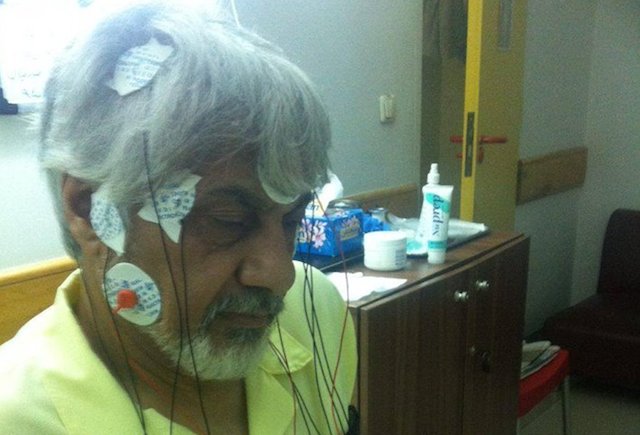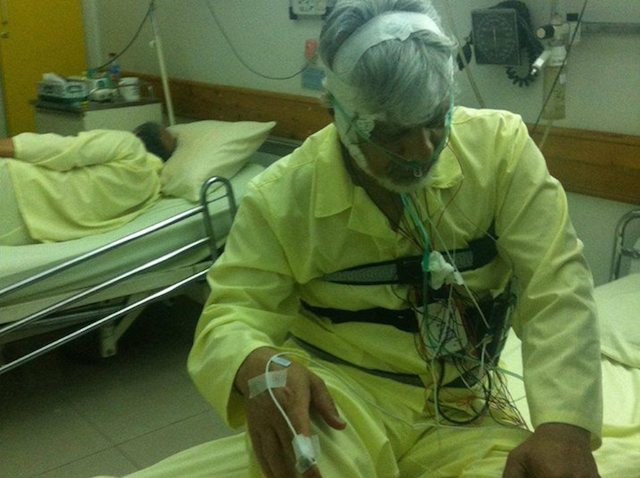News

An Iranian reformist website has published new photos of the critically ill journalist Isa Saharkhiz in hospital following several months of detention by Iran’s Revolutionary Guards. His family is deeply concerned.
“I was shocked to see the pictures of my father,” said his son Mehdi Saharkhiz.
The photos of Isa Saharkhiz, a prominent Iranian reformist journalist who has been held in Iran’s brutal Evin Prison since November 3, 2015, were published on Sunday, April 3, by Saham News, a website of the National Trust party led by reformist politician Mehdi Karroubi. The pictures show the weak 62-year-old journalist undergoing a polysomnography test, also known as a sleep study, in hospital.

Saharkhiz, who suffers from severe kidney problems, heart disease and other health issues, has been on several hunger strikes since his arrest, protesting against prison conditions and the lack of medical care. For the first four months of his detention, Saharkhiz was held in Evin Prison’s ward 2A – a section controlled by the Revolutionary Guards – where his health deteriorated severely.
Yet he has not received proper treatment, according to his son.
“My father has suffered from nerve attacks since the very beginning of his arrest,” Mehdi Saharkhiz, who is based in New Jersey, USA, told Saham news. “The attacks have sometimes happened when he was asleep and they are critical. He has been given medicine and injections to be able to sleep and be calm, but he still hasn’t received any treatment.”
In a letter from prison published on Mehdi’s Facebook account on March 8, 2016, Saharkhiz described the inhumane conditions he has suffered since his arrest.
“I was often locked up in a solitary cell, which is a form of psychological torture. Even when someone else shared a cell with me, it was just to look after me, as, due to various reasons and different illnesses, I have repeatedly fallen down in the room, the bathrooms, the courtyard, during fresh air breaks, etc., due to a severe drop in my blood pressure and poor blood circulation to my brain,” Saharkhiz wrote.
“I also had severe seizures a few times. After three and a half months, and only on orders from the representative of the Legal Medicine Organization, was I transferred to the clinic at Evin Prison,” he wrote.
Saharkhiz was arrested on November 3, 2015, along with at least three other journalists by Iran’s Revolutionary Guards, who accused them of being members of an “infiltration network” colluding with hostile Western governments. However, as the investigator had not been able to make a case for “infiltration,” the journalists were charged with “propaganda against the regime” and “acting against national security.” Saharkhiz’s trial was scheduled to take place on March 8 but was postponed by the court.
Saharkhiz has according to his family lost more than 20 kilos since his arrest. He ended his third hunger strike on March 7 after he was transferred to Evin Prison Ward 8, reserved for financial offenders. Saharkhiz has been since been examined by a neurologist, but prison authorities refuse to send him to a specialist hospital.
The reformist journalist has already spent four years in jail in Iran. He is one of the many activists who were jailed in the aftermath of the contested presidential election of 2009 in Iran. After four years in prison, including nine months in solitary confinement, he was released in October 2013.
In an interview with Journalism Is Not A Crime, Mehdi Saharkhiz spoke about the unjust arrest of his father.
“My father wasn’t doing anything,” Mehdi said. "He was posting on Facebook, maybe talking in different groups, and writing articles for different websites. He was just putting his opinion out there, which according to the Iranian constitution is his right to do. This arrest is completely illegal; it doesn’t have any basis. There is absolutely no evidence presented as what these charges are based on.”
Related articles:
Revolutionary Guards Defend Journalists’ Arrests on Live TV
Arrest of Isa Saharkhiz Signals New Crackdown on Journalists in Iran